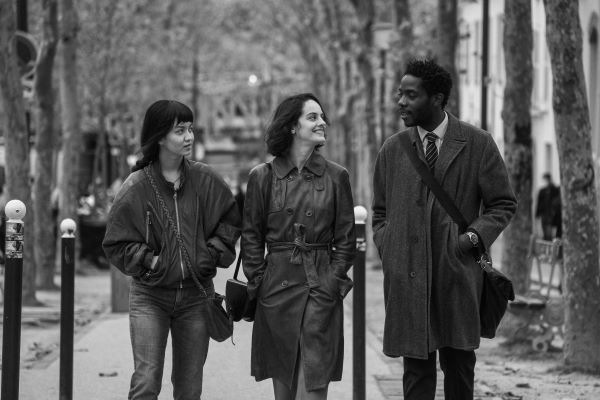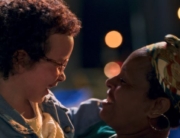Jacques Audiard, director of hard-hitting films with brooding characters (like The Beat That My Heart Skipped and Dheepan), goes lighter with a study of reckless and sometimes feckless youth in Paris, 13th District. The movie’s tasteful EDM soundtrack and high-contrast black-and-white palette gives it an artsy cachet, which it may not quite live up to. Audiard starts out examining conflicted characters and their convoluted interactions, but ultimately wraps up their problems with blithe, facile solutions.
The film takes place in and around Les Olympiades, a huge apartment complex in Paris’s 13th Arrondissement, and hulking shots of high-rise buildings in the dark hint at complex interior lives. Taiwanese Émilie (Lucie Zhang) lives in one of the flats and has family ties to the nearby Chinatown. She becomes roommates, then (sometimes) friends with benefits with a confident young Black man, Camille (Makita Samba). Nora, a White law student from the sticks, will cross their paths before finding her own destiny with an unlikely partner.
These three have loose interactions that feel familiar from movies centered on youth: sex, partying, rivalry. What’s more compelling is Audiard’s deep gaze into their lives. The outwardly dissimilar Émilie and Camille both possess a worrying streak of self-sabotage. Émilie fritters away an elite education getting stoned, making out with strangers, and getting sacked from menial jobs. The more self-possessed Camille pushes others away with his superiority and need to one-up others: A melancholy scene plays out where Camille’s father berates him for mocking his younger sister’s aspirations as a stand-up comedian—she has a pronounced stutter. Camille is at least smart enough to know that Dad is right this time. Negotiating their tentative relationship, or lack of one, Émilie and Camille often bring out the worst in each other.
Prickly yet optimistic and deeply emotive Nora (Noémie Merlant from Portrait of a Lady on Fire) is the script’s most compelling figure, absorbing career and romantic changes with vulnerability and aplomb. It feels awkward, then, for Audiard to mix Nora up in a borderline-farcical yet ugly plot twist of mistaken identity with a sex-cam girl—perhaps this choice was a part of the collection of short stories on which the movie is based, or meant as a trendy reflection on social media and its capacity for ruining lives. Audiard didn’t need this device, as the movie has plenty of social commentary to deliver on the subjects of French economic precarity, snobbery, and in-group bullying. (Camille’s rigidity displays a lower-key, passive-aggressive side of this last phenomenon.)Is it too much to reveal that these flawed but essentially decent characters see the errors of their ways, let down their guard, and open their hearts fast to unlikely love? (Nora, in particular, is once again saddled with a contrived yet highly sentimental plot resolution.) You can see why Audiard wanted to end the movie on a note of hope, although suddenly and not completely authentically, but the decision sits uneasily with the complexity and inner conflict we’ve been riding with all along.

















Leave A Comment